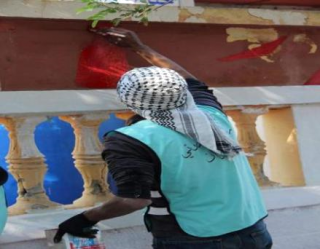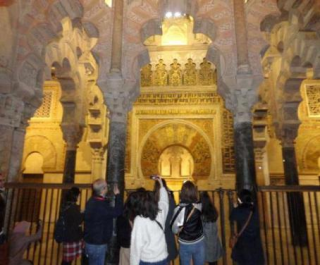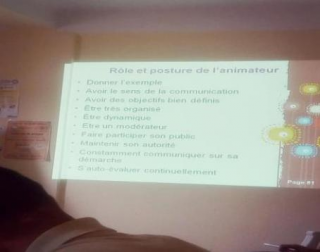Yahia Benyamina, PhD candidate
Permanent researcher
The research center in social and cultural anthropology
Oran, Algeria
Official and academic reports in Algeria emphasize that young people are the most sensitive to unemployment and precarious jobs. Besides the various measures set up by the public authorities to deal with this issue (e.g. educational reforms, strengthening of employment intermediaries, and encouragement of entrepreneurial initiatives) associations[1] are expected to participate in improving and facilitating youth transition to the labor market. As part of my doctoral research on youth civic engagement in Oran (Algeria), I have interviewed 25 young people involved in the associative movement of the city. These young people are divided into 14 men and 11 women, aged between 19 and 30 years old, of which 15 are with university level and 10 with fewer levels. For the activity area of associations where these young people are members, there are five active in youth issues, one in the protection of material heritage, one in health issues, two in the environment, and three in charitable and social solidarity.
While the main interest was looking for the forms of citizenship expression of the new generation, I was however confronted with matters of professional inclusion embodied in associations. My participation in the What works project, initiated by a group of researchers from Tampere University, was an excellent opportunity to approach young people’s involvement in associations from the point of view of youth transition to work. Through a transitional perspective, this project examines youth agency and livelihood strategies while moving from education to the labor market in the MENA region, and in which associations can be put into this analytical framework.
Associations can offer a salary for young people
The strengthening process of professionalization of volunteering activities in Algeria has led many associations to adapt to the management methods of economic enterprises. As a result, some of these civic organizations have over time become able to provide certain types of jobs, as well as to create a space for professional career development, whether for their members or for the target population. During my fieldwork, the young people I met showed several aspects that support this facet. Some associations have offered salaried positions for young people. This is the case with Rachida[2], a 30-year-old young woman and a university student. Her first contact with the associative world took place during a part-time secretary position offered by an association in the field of material heritage protection. Rachida is in charge of the administration and management of the association’s monetary funds, as well as the training of newcomers and the management of projects financed by local and international donors. Although this type of work is rare and unstable, it can be a transition point for a young person that can provide him/her with income and work experience.
Associations can employ marginalized youth or help young people’s capacities to be seen
The jobs created during volunteer activities are another aspect of the work for young people. This typically takes two forms. It can be intentional from the side of the association. For example, an association fighting against drug addiction in Oran, has created a delivery company to employ young drug addicts. At the same time, associations can create jobs also indirectly. Karim, a young man of 28 years old is a good example of this. Active with several associations, this young person found in associations a way to advertise his profession as a draftsman and painter (he e.g. decorates streets, paints walls, and commits hygienic operations). The associations gave him an entitlement to use public space to advertise himself. Sometimes also paid work for certain voluntary activities related to his profession.

A photo received from the interviewee demonstrates his participation in a voluntary campaign led by an association to paint and decorate a wall of a public institution in Oran city.
Associations can provide needed training or skills
Moreover, associations promote the abilities of young people to be employed. This is often done by providing specialized training, whether complementary to that carried out in public training establishments (schools, universities in particular), or intended for certain young people who are marginalized or who have difficulty accessing the labor market. Ahmed is an example of the first aspect. As a young man of 24 and a masters’ student, his first contact with an association was during specialized training on the refinement of stones and the materials that are used to restore ancient monumental buildings. Although he over time developed a sense of volunteerism in the protection of the tangible heritage, his associative activism was initiated in connection with his studies as an architectural engineer at the university.

A photo received from the interviewee showing the field training session in an old cathedral run by an association in the downtown of Oran. The training aims to socialize young people to the protection of the material heritage of the city, as well as to provide practical information and skills on the materials used in the construction of these buildings.
As for the second aspect, there Hafida, 24, a young woman with a secondary education level, can be mentioned. She works as a babysitter for an association. In a non-profit charitable logic, this association seeks to achieve two main objectives: to provide low-cost childcare services to working women in particular and to create jobs and training opportunities for those who lack sufficient skills or work experience. This is what Hafida confirms by affirming that beyond work, her first objective to join the association in question is to acquire professional experience in babysitting, a skill that will allow her to obtain a better-paid job or even to found her own nursery. Informal learning of certain vocational skills is another important form of training for young people. Mehdi, a 22-year-old young man, a master’s student and member of an association interested in youth, which is thanks to the association that enabled him to be able to write official correspondence, to know the laws and rules, to communicate easily with society, and to manage funds in a legal way.
Support and promote entrepreneurial thinking
There is a growing trend within several associations to develop an entrepreneurial spirit among young people. This process may take place through cooperation with local or international partners to funds and associate young people to realize their own economic projects. This is the case, for example, of the Youth Employment Support program which has created an associative network to approach young people in different regions of the country.

A photo downloaded from the program’s official website on facebook: https://www.facebook.com/oran.capjeunesse. 9. It concerns the section of Oran city. In addition to the logos and program partners, the photo contains the following expression “support for the professional integration of young people” where associative networks are activated to facilitate contact with young people and provide them with structures for meetings, communication, training , sociability…
Other associations have adopted this idea and applied it during the activities that do not aim to create economic enterprises for young people but to socialize them to standards of entrepreneurial and managerial thinking. Beyond charitable; humanitarian and social activities, there is informal training on fund-seeking, determining objectives, professional implementation of projects, communication skills, evaluation, and innovation. The idea of a project is a common term in the everyday language of members. Furthermore, all activities are framed as a project which must be conducted according to the managerial principles used in economic enterprises. According to declarations of many young people I have met, inserting entrepreneurial thinking into activities will promote the performance of the association on the one hand, and on the other hand, will prepare young people for professional life.
 This photo was taken in an association during a training session of volunteers on the principles of leadership and animation. The points displayed in the PowerPoint for example emphasize how to manage a team to complete successfully a project through good communication, involving the team in activities, being a good exemple, self-evaluation, being organized, fix clear objectives.
This photo was taken in an association during a training session of volunteers on the principles of leadership and animation. The points displayed in the PowerPoint for example emphasize how to manage a team to complete successfully a project through good communication, involving the team in activities, being a good exemple, self-evaluation, being organized, fix clear objectives.
Also ambiguities become visible
Despite the importance of these professional opportunities embodied in the associative field, two issues arise. On the one hand, there is a contradiction between the non-profit activities required by the law organizing associations and the conversion of associations towards professionalism and entrepreneurial spirit. From a legal point of view, associative activity is free, does not bring a financial return, which limits the margin of their engagement in productive activities related to participation in economic development and social inclusion. Indeed, several association presidents that I have met have raised the fact that the concentration of most associations on redistributive activities has weakened their ability to create lasting solutions to social problems. As a youth association president pointed out, “What is the impact of distributing food, hot meals or clothes for poor people on their development? This is not a sustainable solution for them. It would be better to teach them how to invest, how to develop their jobs and career, or to found their own business and supporting them “.
On the other hand, the experiences acquired during associative activities are not yet officially recognized as professional experience, and in particular, those acquired informally or indirectly (e.g. communication with people, management, and leadership). This despite the issuance by some associations of certificates attesting to the participation of young people in specialized training and professional activities. Articulating the associative experience with other policies of youth inclusion in the labor market would be an additional mechanism to promote youth employment, but also to bring in a workforce that has deep links to the real issues of the community.
[1] According the association’s law n°06-12 promulgated on January 12, 2012, the association is a gathering of natural and / or legal persons on a contractual basis for a fixed or unlimited period. These people share the mobilization of their knowledge and their means voluntarily for the purposes of unprofitable activities, in particular in the following fields: professional, social, scientific, religious, educational, cultural, sporting, environmental, charitable and humanitarian.
[2] All the informant’s names used in the blog are pseudonyms
References:
Aïssa Kadri. (2012).Associations et ONG au Maghreb Aux origines des contestations] Associations and NGOs in the Maghreb The origins of disputes[ . NAQD, 1 (29), p.p.87-117
Omar DERRAS. (1999). Le fait associatif en Algérie. Le cas d’Oran ]The associative fact in Algeria. The case of Oran[ . Insaniyat, n°8, p.p. 95-117
Noureddine Mihoubi.(2015).Transformation du mouvement associatif en Algérie depuis 1989: les voies de la professionnalisation ] Transformation of the associative movement in Algeria since 1989: the ways of professionalization [. Insaniyat, n°69-70, p.p.149-159
Pascal Ughetto et Marie-Christine Combes. (2010).Entre les valeurs associatives et la professionnalisation : le travail, un chaînon manquant ? ] Between associative values and professionalization: work, a missing link ?[. Socio-logos, n°5,
Thierry DESRUES and Marta GARCIA DE PAREDES (2019), “Political and civic participation of young people in North Africa: behaviours, discourses and opinions”. Evista de Estudios Internacionales Mediterráneos, 26, pp. 1-22
